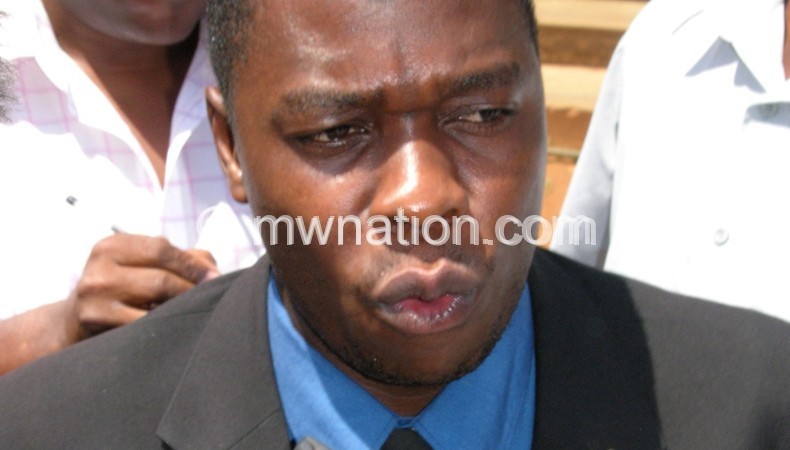MEC, courts blamed for Malawi electoral mess

The Malawi Electoral Commission (MEC) and the Judiciary have been accused of mishandling the May 20, 2014 Tripartite Elections, but the two organisations have parried away the accusations, arguing they worked according to set processes and the law, Nation on Sunday can reveal.
MEC and the Judiciary were singled out during the National Conference on Electoral Reforms which was held in Lilongwe on 11 and 12 December 2014 with an aim to initiate electoral reforms in the country.
According to a Malawi Electoral Support Network (Mesn) conference proceedings summary, the gathering noted that electoral problems Malawi has experienced have largely emanated from “management of elections by MEC, and interpretation of electoral laws” by the Judiciary.
Reads the report, in part: “An analysis of the reported cases clearly shows that the majority of disputes…revolved around the interpretation of the laws.
“This is a sign that our laws are either ambiguous, lack clarity and precision, perpetuate injustice, absurdity or unreasonableness, run counter to popular expectations or fail to provide for unforeseen eventualities.”
Speaking during the conference, lawyer Justin Dzonzi who is also executive director of Justice Link argued that some court decisions on electoral matters have baffled Malawians.
“Due to the mixed expectations Malawians have over electoral disputes, there are also mixed reactions to the judgements and in some cases the courts have taken a rap for them,” he observed.
But Judiciary spokesperson Mulenga Mvula this week disputed the allegations in an exclusive interview withNation on Sunday, saying judges interpret matters based on laws.
“Judges are qualified people; they cannot misinterpret any law to influence the outcome of any case. Judges protect and uphold the Constitution,” said Mvula on Friday.
Another speaker at the conference, political scientist Dr Nandini Patel, pointed out deficiencies in MEC’s strategic plan spanning the years 2013 – 2017, which, she said, have affected the commission’s effectiveness and reputation.
“Apparently, there is mistrust and poor communication between the commission and the secretariat…There are gaps in management as well as operational and logistical structures,” said Patel.
While noting that MEC is an independent organisation, Patel argued the commission is prone to political interference as it is legally answerable to the President.
But MEC commissioner the Reverend Emmanuel Chinkhwita-Phiri said in an interview on Friday that there was no disagreement between the commission and the secretariat during the 2014 elections.
“In fact, there was exceptional team work between the commission and the secretariat and everybody worked diligently to serve the Malawi nation better and ensure that the will of the people was respected,” said Chinkwita-Phiri.
According to the summary, other speakers at the conference observed that the two institutions’ [MEC and the Judiciary] inconsistent decisions during the run-up, the election day and after the elections led people to lose confidence in the commission’s capacity to hold more elections for the country.
During the conference, Mesn chairperson Steve Duwa argued that numerous aspects of the country’s electoral governance—such as the electoral system, the electoral management structure, the civic and voter education and legal framework of elections—need scrutiny and consequently reform.
“There must be serious soul-searching by all stakeholders, meaningful electoral reforms and tangible actions to ensure that the 2019 and other elections to come meet the expectations of the Malawian people,” Duwa told the conference, according to the summary.
Soon after the 2014 elections—which were characterised by challenges including inadequate resources, late delivery of electoral materials at polling stations and delay in tallying of results—various stakeholders also called for reform of the country’s electoral laws.
The conference—which was attended by MEC, government ministries, parastatal organisations, civil society representatives, political parties, the media, security agents officers, international development partners, academia and traditional leaders—proposed the need for the courts or the Law Commission to refine the interpretation of the law and set up a special court to deal with electoral complaints.
In an interview this week, Mesn network coordinator Robert Silungwe said his office will come up with a position paper that will compile all the issues discussed during the conference to be presented at another national conference to be held soon.
“We have four thematic areas [namely, electoral systems, legal framework, elections management and civic education] and committees will look into these areas and consult experts. After that we will start lobbying with government to incorporate the reforms,” he said.
Chinkwita-Phiri expressed confidence that stakeholders working on the reforms would put them into effect before the next elections in 2019.
“The target at the moment is to have the reforms adopted by 2017 so that there is ample time for civic education and the preparation of other electoral processes for the delivery of the 2019 elections,” he said.
Minister of Information and Civic Education Kondwani Nankhumwa said government supports discussions on the electoral reforms whose continuity has already been approved by President Peter Mutharika.
Other speakers at the conference included British High Commissioner Michael Nevin, MEC chairperson Justice Maxon Mbendera, Minister of Lands and Housing Bright Msaka, UNDP senior adviser Sean Dunne, MEC chief elections officer Willie Kalonga and Nice executive director Ollen Mwalubunju. — (See FULL ELECTORAL REFORMS REPORT HERE)





